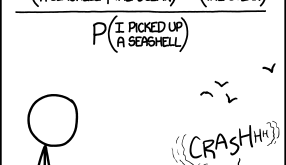Twenty years ago today, a newly wedded couple celebrates in the garden of their summer residence. As always, for you, Jeanette. Though I speak with the tongues of angels, If I have not love… My words would resound with but a tinkling cymbal. And though I have the gift of prophecy… And understand all mysteries… and all knowledge… And though I have all faith So that I could remove mountains, If I have not love… I am nothing.
Read More »Dumb and Dumber — the Chicago economics version
Dumb and Dumber — the Chicago economics version Some years ago, in a lecture on the US recession, Robert Lucas gave an outline of what the New Classical school of macroeconomics today thinks on the latest downturns in the US economy and its future prospects. Lucas shows that real US GDP has grown at an average yearly rate of 3 per cent since 1870, with one big dip during the Depression of the 1930s and a big — but more minor — dip in the recent recession....
Read More »One of my favorite books
One of my favorite books Well, sort of, at least. For those of us who can’t get enough of English eccentrics, Brewer’s Rogues, Villains, Eccentrics by William Donaldson is probably the funniest book ever written. I mean, just to take one example, where else would you find an entry like this one? Carlton, Sydney (1949- ), painter and decorator. Those who argue that bestiality should be treated with understanding had a setback in 1998 when Carlton, a married...
Read More »Tuesday afternoon
.[embedded content]
Read More »To Ukraine with love
To Ukraine with love .[embedded content] To my brothers and sisters in Ukraine.
Read More »Frank Ramsey — a portrait and a critique
Frank Ramsey — a portrait and a critique .[embedded content] Mainstream economics nowadays usually assumes that agents that have to make choices under conditions of uncertainty behave according to Bayesian rules, axiomatized by Ramsey (1931) and Savage (1954) — that is, they maximize expected utility with respect to some subjective probability measure that is continually updated according to Bayes theorem. If not, they are supposed to be irrational, and...
Read More »De Finetti on the dangers of mathematization
De Finetti on the dangers of mathematization Let us bear in mind …that everything is based on distinctions which are themselves uncertain and vague, and which we conventionally translate into terms of certainty only because of the logical formulation … In the mathematical formulation of any problem it is necessary to base oneself on some appropriate idealizations and simplification. This is, however, a disadvantage; it is a distorting factor which one...
Read More »Yanis Varoufakis on the irrelevance of mainstream economics
Yanis Varoufakis on the irrelevance of mainstream economics .[embedded content] Varoufakis is undoubtedly right — there is indeed something about the way mainstream economists construct their models that obviously doesn’t sit right. One might have hoped that humbled by the manifest failure of its theoretical pretences during the latest economic-financial crises, the one-sided, almost religious, insistence on axiomatic-deductivist modelling as the only...
Read More »Windfall tax on oil companies
Windfall tax on oil companies .[embedded content]
Read More »How to battle inflation
How to battle inflation .[embedded content]
Read More » Lars P. Syll
Lars P. Syll






